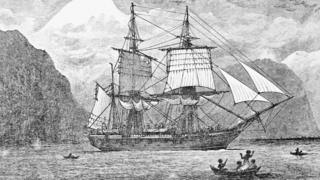HMS Beagle: Dock for Darwin's ship gets protected status
 Image copyright Historic England/PA
Image copyright Historic England/PA
The remains of a rare 19th Century dock built for Charles Darwin's ship HMS Beagle has been recognised as a site of national importance.
The submerged mud berth on the River Roach in Rochford, Essex, will now be protected against unauthorised change.
The ship, launched in 1820, allowed Darwin to make observations that led to his theory of natural selection.
"We are glad to see this site in a quiet corner of Essex given national protection," said Historic England.
"This is a fascinating example of a rare piece of maritime history."
Paglesham mudflats, near Southend, was thought to be the last resting place of the Beagle and investigations into the site began last year.
The team from Wessex Archaeology were able to reveal the outline of the dock using a drone fitted with a specialist camera.
Historic England commissioned the team to research the area ahead of the bicentenary of the vessel's launch this month.
Darwin was aboard the ship on its second great voyage between 1831 and 1836 to survey the South American coast and the Galapagos Islands.
'Significant site'
Following the Beagle's third and final exploratory voyage in 1843, it was refitted as a static watch vessel for the coastguard in 1845, until sold in 1870.
Historic England said documentary evidence showed the ship was in the Rochford dock in 1870 and was likely dismantled there.
The site has been designated as a scheduled monument by the Department for Digital, Culture, Media and Sport on the advice of Historic England.
Rochford District Council also plan to build a new observation platform at the RSPB Wallasea Island Wild Coast Project, overlooking the River Roach where the ship was moored.
Find BBC News: East of England on Facebook, Instagram and Twitter. If you have a story suggestion email eastofenglandnews@bbc.co.uk
Source : BBC News - Science & Environment
HMS Beagle: Dock for Darwin's ship gets protected status
HMS Beagle: Dock for Darwin's ship gets protected status
